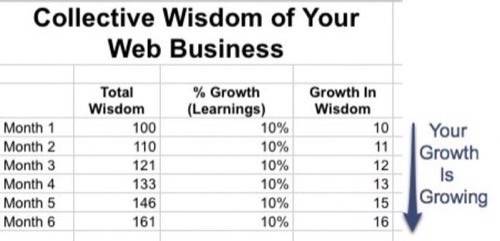“It is the greatest mathematical discovery of all time.” – Albert Einstein on compound interest.

There is a fallacy that startups need to be super-secretive and then, when they launch, move very fast to capture the market. This is rarely true. Most startups would do well to study compound interest rather than market share.
Compound interest is about gains that are reinvested back into the asset base so that the next gain will be higher. The interest earns interest. The table below shows a new Web business at the very beginning, with only 100 wisdom points (a made-up term). The business is learning at a reasonable rate, with 10% growth in its useful knowledge each month. And, as you can see, its monthly growth in real units is growing; this is the compound interest. You get the idea.

Typical Thinking
“I’ve got an idea that no one has ever thought of. I’d better not tell anyone because as soon as I launch it, everyone will copy me. I’ll develop it in secret, and then when my vision is ready, I’ll launch it with great gusto and have a big sales and marketing campaign ready to go to snap up customers, who are all going to flock to me.”
Typical Reality
You’ve got an idea that 100 people have had, 10 have already started working on, and probably a few have failed at. If you don’t tell anyone or are so excited that you don’t do your research, you won’t find out about the 10 who have started working on it. You also don’t invite 100 experienced people to help you refine your product, all of whom are far too busy to steal your idea anyway. You develop it in secret, and then 30 seconds after you finally launch, 50 people tell you about little things that are broken or need tweeking (a “tweek” being any change that you think will take two hours but ends up taking two weeks: tw(o) (w)eeks, get it?). You spend the next 6 months scrambling to get the product up to scratch. Customers don’t come flocking. They come dribbling in like glue-covered sloths, whinging about every little thing you’ve missed.
Party Pooper?
I’m no party pooper. I’ve just been through it and made the mistakes. Ideas are awesome, building products is awesome, and releasing and getting feedback (and getting slapped around) by real customers is super-mega awesome. I just want to do it all better from now on, and so I thought I’d share my thoughts and get yours. So here goes.
First Mover (Dis)Advantage
I always liked the saying that the early bird gets the worm. However, the second mouse gets the cheese. Breaking new ground means that you get to be the first one out there, but it also means you have no paths to follow, no wisdom to heed, and no mentors to be mentored by. You have to hack that sucker open. It’s harder. It really is.
Learn and Keep Learning
Yes, it’s harder, but you’re the first one to make these mistakes, and so you’re the first one to learn the lessons. Now you’re the mentor. Or at least you could be if you stay very focused and don’t hit the CEO speakers’ circuit just yet. Keep your eye on your customers and their problems. Keep your eye on your metrics. Keep testing. What’s working? What could be better? What’s evolving now, and what will always be evolving? You have the opportunity to stay in front, and you have the challenge to not get caught up juggling those many brightly colored balls.
Compound Interest
Like most good things, compound interest benefits from education. Everything you learn builds on and adds value to everything else you’ve learned. It expands, clarifies, and refines it and makes it better. If you pay attention and really test, watch, observe, and listen with an open mind, then you won’t have to learn a lesson more than once. Learn it, add it to your knowledge pile, and move on to the next lesson.
Complacency
Remember that a lesson is repeated until learned. Think you’ll get it right the first time and won’t need to test and learn? You’re probably in for a rude shock. Think you won’t need to pay constant attention to customers and to how the product is helping people solve a problem they really care about? You’re going to be frustrated by the results. Your plan should not be:
- Build the product,
- Promote the tail off of it.
You’ll very rarely get it right the first time. Imagine yourself going into the coffee business. Would you install an espresso machine, open your cafe, invite the media to the opening, and let them be the first to taste it? No, you’d install the machine, taste it yourself, keep working on it until it improves, then try it out on some friends. You’d refine it, test it, refine it, etc.
Working Product vs. Working Business
Building a website that performs the basic functionality you want is hard, but do-able. Just because a website works does not mean it is a working business. This is a very common mistake. I repeat: a working website is not a working business. A working business achieves your business goals profitably. It does not just ask, “Does the home page look good?” It also asks:
- Does the home page attract enough prospects, and does it convert a high enough percentage of them into users or sales?
- Does the purchasing process convert enough users into sales?
- Does the content on the pages generate enough clicks on ads?
- Is the product so useful and easy to use that customers keep coming back and start inviting their friends?
These questions are about the “business” of your product. You can see that by asking them, testing them, and working towards the answers, you get compound interest. Unfortunately, none of this happens quickly.
Got Time?
The most crucial variable in compound interest is time. Initially, compound interest doesn’t appear to have much of an effect. It’s only over time that you start to build momentum and see the big positive impact. So, the longer you stay around, the better you’ll get. This is tough for young companies. They’re usually very short on money, which makes them even shorter on time. There is no avoiding it, though: you need enough time to make enough mistakes to become great.
Market Share
New product areas are rarely land grabs. Even hosted email, which seemed to promise amazing lock-in, shows significant churn. More often than not, the first to enter the market pays the highest cost of learning and burns out before they nail it. They pave the way for the market winners who follow. Yes, you might get in first and grab market share, but the only way to keep that share is to keep moving forward at a faster pace than your competitors.
Bottom Line
If you move into a new space, the market normally takes as long as you do to mature enough to become really profitable. Keep your team focused, be patient, create value, test, test, test, and you’ll get there. If your instincts are as good as you think they are, then it will come… if you can stick around long enough. Invest today.
Mick Liubinskas is Co-Founder and Web Product Director of Pollenizer, a firm that helps Web businesses with technology, marketing, and operations. He was also Head of Marketing for Kazaa, Tangler, and Zapr.

















